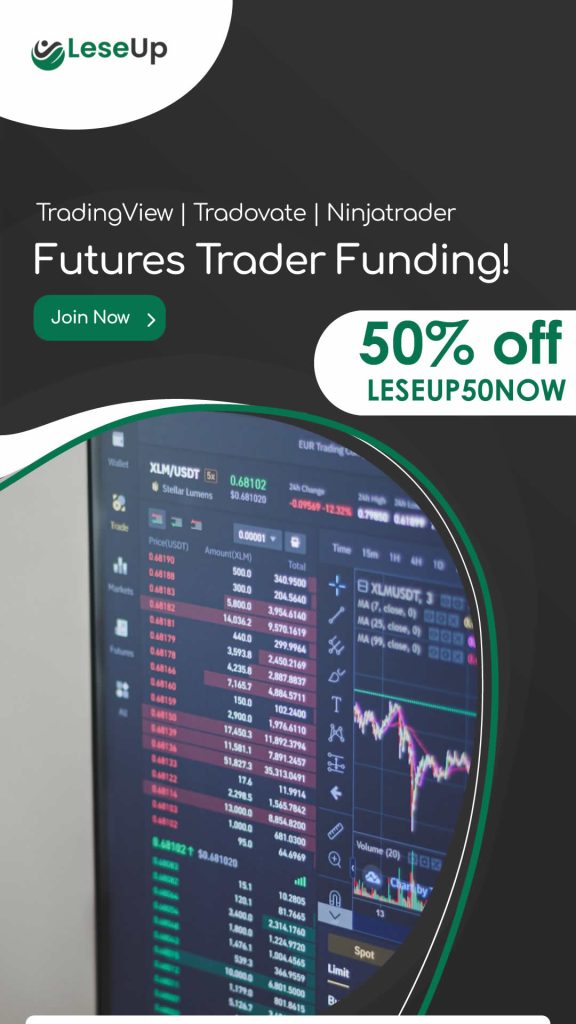The scalping strategy, a high-frequency trading technique, offers traders a way to profit from minor price movements in futures markets. By executing a high volume of trades within short time frames, scalpers can accumulate small gains that collectively provide substantial upside. However, this strategy comes with risks that require careful management. This guide explores scalping strategy in-depth to equip you with the knowledge needed to implement it effectively.
Key Takeaways
- Scalping involves executing numerous trades to profit from small price changes.
- Scalping relies on analytical tools and charts to predict price movements.
- Scalping requires high-speed decision-making and constant market monitoring.
- Scalping carries risks such as increased exposure to market volatility and slim profit margins per trade.
Understanding the Concept of Scalping
The concept of scalping in futures trading involves the execution of a large number of trades to profit from small price changes, typically within short time frames. This high-frequency trading strategy originated as a response to technological advancements and the increased speed of market transactions. The origins of scalping can be traced back to floor traders who capitalized on brief, minor discrepancies in bid-ask spreads.
Scalpers employ an array of analytical tools and charts to predict minute price movements and execute trades swiftly and frequently. The success of this technique hinges on significant volume trading, where even minuscule profits per trade can accumulate into substantial gains due to the sheer multitude of transactions.
While it is crucial to understand scalping’s origins, it is equally important to acknowledge its ethical implications within futures trading. Critics often question the fairness and legitimacy of this strategy, arguing that it may create artificial market volatility by exploiting momentary inefficiencies for individual profit. Furthermore, concerns arise around information asymmetry since scalpers possess sophisticated technology allowing quicker access to market trends than average investors.
However, proponents assert that scalping contributes positively toward liquidity provision in financial markets by facilitating more efficient price discovery through its constant buy-sell activity. Such viewpoints underscore that while ethics in scalping may appear ambiguous, the tactic ultimately forms part of a broader landscape where diverse strategies coexist – each with its benefits and potential drawbacks depending upon circumstance-specific considerations including risk tolerance levels alongside technical proficiency among other factors inherent within dynamic financial markets.
The Mechanics Behind Scalping in Futures Trading
In financial markets, rapid buying and selling of contracts to achieve minute profit margins form the core mechanics behind this particular approach in commodity exchange. This method, known as scalping, has become increasingly prevalent in futures trading due to technological advancements that facilitate high-frequency transactions. However, with its rise, questions surrounding scalping ethics and legality have also emerged.
The underlying strategy for scalping involves leveraging small price changes multiple times a day. Traders must possess an in-depth understanding of the market and demonstrate high levels of discipline to execute these trades successfully. It requires:
- High-speed decision-making and execution
- Constant market monitoring
- Proficiency in using automated trading tools
- Understanding market trends at micro-levels
- Ability to bear significant risk
Scalpers typically aim for consistency rather than large profits from individual trades. They capitalize on highly liquid markets where small price movements occur frequently throughout the day.
However, despite its profitability potential, concerns about scalping ethics arise due to its perceived disruptive influence on markets. Critics argue that it exacerbates volatility and undermines long-term investors’ interests by creating artificial price movements.
Regarding scalping legality, while it is legal within regulated exchanges such as commodities or futures markets globally, some countries impose restrictions on high-frequency trading methods like scalping due to their potential impact on financial stability.
To navigate these complexities effectively requires traders not only to understand the mechanics behind scalping but also to be aware of the ethical implications and legal constraints associated with this high-frequency trading strategy.
Advantages of Using Scalping as a Trading Strategy
Advantages associated with this rapid buying and selling approach in financial markets include:
- Potential for consistent profits
- Increased opportunities due to market volatility
- Enhanced control over trades due to their short duration
The scalping strategy allows traders to exploit minute price changes that may occur within seconds or minutes, thus providing a way for them to capitalize on small, frequent gains that can accumulate substantial profits.
Scalping tax implications should be considered as part of the trading strategy. Given the high volume of transactions involved in scalping, transaction costs can quickly accumulate. However, some jurisdictions may offer favorable tax treatment for short-term trading activities which could offset some of these costs.
Market volatility represents both a risk and an opportunity in scalping. While sudden price swings can produce losses, they also create numerous trading opportunities within a single day. The ability to exit positions swiftly curtails exposure to adverse market movements and reduces potential losses.
Control is another significant advantage associated with scalping. Since positions are held for very brief periods, traders retain greater control over their trades. This allows them to respond more promptly to changing market conditions compared with other strategies where positions are held longer term.
However, it’s crucial to consider the ethical considerations tied up with a scalping strategy as well. While it does provide profit-making opportunities through quick transactions, its aggressive nature might contravene certain regulations or pose risks such as market manipulation if not carried out responsibly.
Risks and Challenges in Scalping Futures
Risks and challenges associated with rapid buying and selling in financial markets, particularly those concerning futures contracts, require careful consideration. Understanding these complexities is essential for effective risk management in scalping. This high-frequency trading strategy involves making numerous trades within a day to capitalize on minor price fluctuations. However, it presents several risks.
Firstly, the sheer volume of trades executed increases exposure to market volatility. Even marginal losses can quickly accumulate due to the frequency of transactions. Therefore, a robust risk management strategy is crucial in scalping to mitigate potential losses.
Secondly, optimal execution is paramount in scalping due to the slim profit margins per trade. The smallest delay or error can transform a profitable trade into a losing one, highlighting the importance of technological efficiency and precision.
Lastly, Scalping’s psychological toll should not be overlooked. It demands intense focus and fast decision-making under pressure which may lead to emotional trading decisions detrimental to profitability if not properly managed.
Despite these challenges, successful scalpers have demonstrated that strategic planning coupled with disciplined execution can yield significant returns from this approach. They consistently monitor their performance against pre-set benchmarks and adapt their strategies as necessary based on real-time market conditions while also managing psychological stresses inherent in such an active trading method.
Necessary Tools for Successful Scalping
Achieving success in rapid transaction activities necessitates the use of specific tools, including advanced software platforms, real-time market data feeds, and robust hardware setups. In particular, scalping – a high-frequency trading strategy for futures – requires an understanding of these tools to maximize efficiency.
Firstly, the choice of Scalping software is pivotal. This software should facilitate fast execution speeds and offer access to real-time market data. Additionally, it must accommodate technical analysis indicators that are crucial for making informed decisions within the brief timeframes typical of scalping.
The importance of real-time market data cannot be overstated; it provides traders with up-to-the-minute price changes essential for quick entry and exit points during trades.
Robust hardware setups can significantly enhance trade execution speed. High-speed internet connections ensure immediate order placement and reception of critical market updates.
Understanding Scalping psychology is also fundamental to this trading approach:
- It involves maintaining an objective stance despite frequent wins and losses.
- Traders need to have a firm grasp of risk management principles.
- A high level of discipline is required as emotional decision-making could prove detrimental in this fast-paced environment.
In conclusion, achieving profitable outcomes from scalping involves not only rigorous preparation but also choosing the right technological tools – such as state-of-the-art Scalping software – being equipped with live market feed data and deploying robust hardware systems.
Moreover, mastering the psychology involved in such rapid transaction activities plays a significant role in ensuring long-term success within this demanding financial market arena.
Essential Skills for High-Frequency Trading
The transition from necessary tools for successful scalping into essential skills needed for high-frequency trading takes a deeper dive into the intellectual toolkit required. The sophisticated nature of futures scalping necessitates a comprehensive understanding of financial markets and, importantly, algorithm selection and emotional control.
Algorithm selection pertains to the careful choice of mathematical models used in executing trades. High-frequency traders often employ algorithms to automate trading processes, reduce transaction times, and increase profitability. These quantitative models are designed to interpret market data at lightning speeds, identifying profitable trade opportunities that might otherwise go unnoticed.
Emotional control refers to the trader’s capacity to maintain an objective stance towards trading activity. Emotional responses can lead to hasty decisions detrimental to profitability. Thus, mastering emotional control is crucial in maintaining consistency and resilience in this fast-paced environment.
To articulate these concepts further, consider the table below:
| Essential Skills | Description |
|---|---|
| Algorithm Selection | Involves choosing appropriate mathematical models for automating trading processes which interpret market data efficiently with speed |
| Emotional Control | Refers to maintaining objectivity during trading activity; and preventing rash decisions induced by emotional responses |
| Market Understanding | Knowledge of financial markets operations including factors influencing price movements |
| Risk Management | Ability to identify potential risks and mitigate them effectively; key in preserving capital |
| Speed | Rapid response and execution time are critical due to fleeting scalp opportunities |
These skills amalgamate into a robust skill set vital for effective high-frequency trading within futures markets. The combination ensures the optimal application of technical tools whilst fostering a conducive psychological climate.
Case Study: Successful Scalping Strategies
Examining particular instances of profitable maneuvers in the market can shed light on successful practices and methodologies. A case study into the application of scalping, a high-frequency trading strategy for futures, reveals important insights into its effective use.
Scalping involves executing large volumes of trades within short time frames to take advantage of small price changes. This approach is characterized by its potential for quick profits; however, it also carries significant pitfalls that are essential to understand for sustainable success.
One key challenge in scalping revolves around transaction costs. Given the high volume of transactions involved, these costs can substantially erode profit margins if not carefully managed. Successful scalpers often employ strategies such as utilizing brokers with low transaction fees or trading assets that carry inherently lower transaction costs.
Scalping longevity largely depends on maintaining strict discipline in adhering to pre-set profit targets and stop-loss levels per trade. It is crucial to exit positions swiftly once these parameters are reached to safeguard against potentially larger losses from rapidly fluctuating markets.
Moreover, continuously monitoring market conditions is vital due to the highly responsive nature of this strategy. Subtle shifts such as changes in volatility or liquidity could significantly impact trade outcomes and need prompt adjustments to maintain profitability.
How to Optimize Scalping Techniques
Optimization of these quick-profit techniques necessitates an in-depth understanding of the market dynamics and a firm grasp of risk management methodologies. It is essential to have suitable scalping software choices, as they play a crucial role in this high-frequency trading strategy.
Several software options exist that are specifically designed for scalping. These provide real-time data analysis, enabling traders to make rapid decisions based on current market conditions. Optimal software includes features such as advanced charting tools and automated trade execution, allowing for swift entry and exit from trades.
Nevertheless, it’s not merely about picking the right tools; understanding the psychological aspects of scalping is equally important. This high-frequency trading strategy can be stressful due to its fast-paced nature which requires constant decision-making under pressure. Handling such stress effectively involves maintaining emotional discipline to avoid impulsive actions that could lead to substantial losses.
Risk management is another key element in optimizing scalping techniques. Traders must adhere strictly to their predetermined risk levels per trade and daily loss limits, ensuring capital preservation despite the high volume of trades conducted during each session.
The Impact of Market Volatility on Scalping
The examination of market volatility’s influence on scalping provides an intriguing area for discussion within the realm of high-frequency trading strategies. By delving into this topic, an understanding will be developed of how scalping maneuvers are adjusted and optimized during periods of intensive market fluctuations.
This exploration not only elucidates the intricate relationship between volatility and scalping but also offers insights into how traders can exploit such conditions effectively, thereby contributing to a comprehensive understanding of futures trading dynamics.
Volatility’s Influence on Scalping
Volatility significantly influences scalping as it impacts the frequency and profitability of this high-frequency trading strategy for futures. The higher the volatility, the greater the number of trading opportunities, potentially increasing scalping profitability. However, extreme volatility can also heighten risks.
Understanding how volatility interacts with scalping requires an analysis of:
- Scalping psychology: Traders need to maintain discipline, manage stress, and make quick decisions in volatile markets.
- Risk management: High volatility necessitates robust risk control measures to protect against significant losses.
- Scalping profitability: Increased market fluctuations can lead to larger spreads between buy and sell prices, affecting profit margins.
Overall, successful scalpers must master managing their emotions under high-pressure situations while maintaining strict stop-loss orders to mitigate risk.
Scalping During Market Fluctuations
Market fluctuations present both opportunities and challenges for those engaged in rapid buying and selling activities during these periods of intense movement. The psychology of scalping involves maintaining composure to make quick decisions based on market trends and leveraging these fluctuations.
| Opportunities | Challenges |
|---|---|
| Potential for high profit | Tax implications |
| Real-time decision making | Increased competition |
| Market volatility benefits | High transaction costs |
| Flexibility in trading hours | Emotional stress |
These tax implications should be considered as the high frequency of trades can lead to substantial taxes on short-term capital gains. Understanding this complexity is crucial for successful scalping amid market fluctuations. Hence, a comprehensive grasp of financial markets and the ability to interpret these complex trading strategies is essential.
Future Trends in Scalping and High-Frequency Trading
The advent of technological advances has significantly influenced the landscape of high-frequency trading. Particularly in terms of scalping strategy. Concurrently, regulatory changes have brought about profound effects on this realm. Imposing restrictions and new rules that shape the way financial markets operate.
Furthermore, the evolution of the scalping strategy has also been an intriguing area to explore. Market participants continually seek innovative ways to optimize their trading activities amidst rapidly changing market conditions.
Technological Advances Impact
Advancements in technology have significantly influenced the efficiency and speed of scalping, a high-frequency trading strategy for futures. The integration of artificial intelligence (AI) and algorithmic advancements have particularly revolutionized this approach.
- AI Integration
- AI has improved predictive analytics, allowing traders to anticipate market movements more accurately.
- Automation through AI reduces human error, improving efficiency.
- Algorithmic Advancements
- Algorithms can process vast amounts of data at high speeds, increasing the profitability of scalping strategies.
- Advanced algorithms allow traders to adapt rapidly to changing market conditions.
The technological evolution is transforming the landscape of financial markets. Stakeholders must understand how these changes impact high-frequency trading strategies like scalping. The future will see further enhancements refining these strategies.
Regulatory Changes Effects
Regulatory shifts in financial markets bear significant implications for the implementation of technology-driven approaches. In particular, high-frequency trading strategies such as scalping face distinct regulatory repercussions. These can include tightened compliance constraints that impact their effectiveness and profitability.
Such changes reflect an effort by regulators to maintain market integrity and protect retail investors from potential abuses. They could, for instance, impose strict order-to-trade ratios or mandate minimum resting times for orders in a bid to curb excessive trading volumes often associated with scalping.
Despite these challenges, it is crucial to note that regulations are not inherently detrimental. Rather, they demand innovative adaptations within the technological setup supporting these high-speed strategies. Thus, while disrupting existing methodologies, regulatory evolution also spurs further advancements in trading technology.
Scalping Strategy Evolution
Alterations in rapid asset buying and selling methodologies continue to evolve, influenced by both market dynamics and external factors such as regulatory changes. One strategy that has undergone significant transformation is scalping.
This high-frequency trading approach, which involves the execution of large volumes of trades within a short time frame, has been at the center of many scalping controversies due to its potential for manipulation and exploitation. Yet, it persists due to its effectiveness in volatile markets.
The ethics of scalping are continuously under scrutiny with discussions centered on ensuring fair market practices while permitting traders to pursue profit-making opportunities. As such, the evolution of this intriguing strategy remains closely tied not only to technological progress but also to ethical guidelines and regulatory oversight.
Frequently Asked Questions
How Does the Regulatory Environment Impact Scalping and High-Frequency Trading?
Regulatory challenges significantly influence scalping and high-frequency trading. Regulatory bodies impose rules to ensure market fairness, impacting the speed and frequency of trades. Compliance costs also affect these strategies as firms must invest in surveillance systems to monitor trading activities and avoid regulatory breaches.
The need for rapid decision-making combined with complex compliance requirements creates an intricate dynamic between high-frequency trading, scalping, and the overarching regulatory environment.
Are There Specific Personality Traits That Make a Trader More Successful at Scalping?
Successful scalpers often exhibit specific personality traits, such as high-risk tolerance and quick decision-making capabilities.
Psychological resilience plays a crucial role in managing the stresses associated with this high-frequency trading strategy.
Furthermore, effective scalping risk management necessitates an ability to swiftly analyze market conditions and adapt strategies accordingly.
Therefore, certain traits can predispose individuals towards success in scalping, yet diligent study of financial markets remains paramount.
What Are Some of the Ethical Concerns Related to Scalping and High-Frequency Trading?
Ethical concerns surrounding scalping and high-frequency trading often revolve around notions of ‘Scalping Legality’ and ‘Manipulation Risks’. Critics argue that these strategies can distort market prices, disadvantage slower traders, and potentially breach fair trading laws.
Furthermore, the ability to execute trades at extremely high speeds may provide an unfair advantage, thus raising questions about equitable market access.
Therefore, the ethics of scalping and high-frequency trading remain a contentious issue in financial markets.
Can Scalping Be Successfully Applied in Other Financial Markets Like Stocks or Forex?
Scalping, as a high-frequency trading strategy, carries potential applicability across various financial markets such as stocks and forex. However, its successful implementation depends on an in-depth understanding of market volatility, liquidity, and transaction costs.
Scalping risks include rapid market fluctuation and technological failures. Forex scalping mainly requires proficiency in currency pair dynamics, geopolitical influences, and economic indicators.
Therefore, while possible to apply scalping in these markets, careful consideration of associated risks is paramount for effective execution.
How Has the Rise of Algorithmic Trading Influenced Scalping Strategies?
The rise of algorithmic trading has significantly influenced scalping strategies, leading to an evolution in algorithmic scalping. Technological advancements have enabled high-speed, precise transactions and real-time market data analysis, enhancing the efficiency and profitability of scalping.
Consequently, this transformation has resulted in increased competition among traders, necessitating further innovation in devising effective high-frequency trading strategies.
Therefore, the technological impact on scalping is profound and continues to shape the landscape of financial markets trading.
Conclusion
In conclusion, scalping stands as a high-frequency trading strategy that offers numerous advantages but also presents certain challenges. This approach necessitates advanced tools and an in-depth understanding of market volatility.
The future of scalping lies in the continuous development of high-frequency trading technologies, which can potentially boost its effectiveness and profitability. Therefore, traders need to continuously upgrade their strategies to stay competitive in the dynamic world of futures trading.





